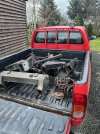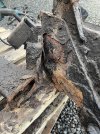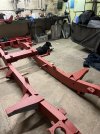There have been a few discussions whereby people have had rust appearing on galvanised chassis’ recently. It’s probably subjective but has anyone had a shorter than expected life expectancy to their galvanised chassis? I appreciate that painting the chassis would extend its life but I’m looking at how long the standard finish would last.
You are using an out of date browser. It may not display this or other websites correctly.
You should upgrade or use an alternative browser.
You should upgrade or use an alternative browser.
Life expectancy of galvanised chassis
- Thread starter Knappster
- Start date
This site contains affiliate links for which LandyZone may be compensated if you make a purchase.
saxavordian
Well-Known Member
- Posts
- 9,351
My guess would be what connected to the galvanized metal that allows water to create rust. Most are bolted on an area exposed, to road salt and getting wet from rain mud sand out of sight. Then it's down to the user maintenance in cleaning said chassis.
chrisstdt
Well-Known Member
- Posts
- 923
- Location
- scottish borders
All depends on extra coatings and usage
Mine has rusted but it wasn't painted and is an everyday vehicle so gets lots of winter conditions thrown at it
Mine has rusted but it wasn't painted and is an everyday vehicle so gets lots of winter conditions thrown at it
300bhp/ton
Well-Known Member
- Posts
- 5,029
- Location
- Near MK
How long is a piece of string…..There have been a few discussions whereby people have had rust appearing on galvanised chassis’ recently. It’s probably subjective but has anyone had a shorter than expected life expectancy to their galvanised chassis? I appreciate that painting the chassis would extend its life but I’m looking at how long the standard finish would last.
Must be a million factors that can massively impact this. There simply will not be a single answer.
300bhp/ton
Well-Known Member
- Posts
- 5,029
- Location
- Near MK
I’m
But remember galv is sacrificial, so if you expose it to high corrosion environments it will eventually rust through. Just look at galv farm gates.
Also bear in mind some chassis’s may have been galvanised by owners or rebuilders and not a new galv chassis. These are far more likely to rust sooner.
For many years there was only real 2 choices. Plenty of people have them and I’ve not personally seen anyone claiming rust problems.Agree, hence my comment about it being subjective. I do wonder if galvanised chassis’ are not necessarily a fit and forget option in many cases.
Are any makes longer lasting than the others, aside from use, etc?
But remember galv is sacrificial, so if you expose it to high corrosion environments it will eventually rust through. Just look at galv farm gates.
Also bear in mind some chassis’s may have been galvanised by owners or rebuilders and not a new galv chassis. These are far more likely to rust sooner.
Hicap phill
Well-Known Member
- Posts
- 16,335
- Location
- Wiltshire
Galved my own chassis and the only part that shows any trouble is cross member where salt water gets flicked off the wheels (no mud flaps) No I don’t wash my motor & it had a hard few years when first built. 20+ years and no trouble
- Posts
- 6,663
- Location
- uk
Corrosion resistance of steel depends largely on the quality of the steel itself. When I was in the construction industry (now re-tyred) the highest quality steel was used in - for example - steel sheet piles in marine works. The life expectancy was measured in decades, in a salt water environment, with minimal coating. Another steel grade used for some items on motorway work, was Corten grade steel. No coatings were required, the steel took on a surface rust and no further corrosion took place. A bit like cast iron manhole covers. Lower grade steels, with relatively high content of impurities, starts to corrode from within. Protective coatings are not much help in such circumstances. So a galvanised chassis should last for ever if it is made from quality steel, and have a shorter life if it is made from a lower grade steel.
Forrest Gump
Well-Known Member
- Posts
- 256
- Location
- Edinburgh
I hope so mate…I ain’t changing another one…If a thinly black painted one can last 20 yrs then I would say a galv one will last longer than any person on this forum has left to live.
This could lead to another discussion as to which manufacturer uses the best quality steel in their chassis then. A subject which has likely been done before…Corrosion resistance of steel depends largely on the quality of the steel itself. When I was in the construction industry (now re-tyred) the highest quality steel was used in - for example - steel sheet piles in marine works. The life expectancy was measured in decades, in a salt water environment, with minimal coating. Another steel grade used for some items on motorway work, was Corten grade steel. No coatings were required, the steel took on a surface rust and no further corrosion took place. A bit like cast iron manhole covers. Lower grade steels, with relatively high content of impurities, starts to corrode from within. Protective coatings are not much help in such circumstances. So a galvanised chassis should last for ever if it is made from quality steel, and have a shorter life if it is made from a lower grade steel.
300bhp/ton
Well-Known Member
- Posts
- 5,029
- Location
- Near MK
I’m not sure you’ll easily find out what steel is used by the different makers. Not to mention it may well have varied over time or maybe even batch to batch in some instances based on availability or supply.This could lead to another discussion as to which manufacturer uses the best quality steel in their chassis then. A subject which has likely been done before…Would any one manufacturer outlast another, taking into account use, conditions, etc of the vehicle it is fitted to?
Forrest Gump
Well-Known Member
- Posts
- 256
- Location
- Edinburgh
Coupla pics on chassis’s lads. The old one was totally done…no room left to repair. New MAER one getting primed/painted and the 90 coming together and finally done the other week. A lot of work and late nights…and hiding receipts from my sweetheart 
Attachments
BikerB
Well-Known Member
- Posts
- 6,439
- Location
- Far up North
I took the chance before assembling mine to give it a proper 4 coat undercoat/topcoat paint job as well as pumping it full of anti corrosive wax. Once the elements get through that lot they still need to deal with the galv.
I don't expect to have to change the chassis this side of not being able to drive it because of infirmity and hoping that will be a good number of years yet
I don't expect to have to change the chassis this side of not being able to drive it because of infirmity and hoping that will be a good number of years yet
Forrest Gump
Well-Known Member
- Posts
- 256
- Location
- Edinburgh
Same here. Mine got hammered with anti corrosion treatment. 5 coats in total and like to say Biker it’s got galv to tackle after that. I’ll be wearing a wooden coat by then I hope cos I ain’t welding this one. 
norseman
Well-Known Member
- Posts
- 3,278
- Location
- Essex - UK
The quality of the steel plus the construction is key.
I used to own WW2 American military vehicles & they never suffered anything more than surface corrosion on the chassis, despite never being built to 'last' .. they were going to war after all.
Not only was the steel quality better than today's the Yanks had the sense to employ open channel frames rather than LR's box section made from thin steel, which of course rusts from the inside. Given that the Wilks brothers based the LR on a wartime Jeep you have to wonder why they didn't copy the chassis design as well .. post-war steel shortages I guess.
I used to own WW2 American military vehicles & they never suffered anything more than surface corrosion on the chassis, despite never being built to 'last' .. they were going to war after all.
Not only was the steel quality better than today's the Yanks had the sense to employ open channel frames rather than LR's box section made from thin steel, which of course rusts from the inside. Given that the Wilks brothers based the LR on a wartime Jeep you have to wonder why they didn't copy the chassis design as well .. post-war steel shortages I guess.
6pot
Well-Known Member
- Posts
- 704
- Location
- Depends...
Maybe if such a thing existed a Corten steel chassis would be better than a galv one - overkill perhaps?Corrosion resistance of steel depends largely on the quality of the steel itself. When I was in the construction industry (now re-tyred) the highest quality steel was used in - for example - steel sheet piles in marine works. The life expectancy was measured in decades, in a salt water environment, with minimal coating. Another steel grade used for some items on motorway work, was Corten grade steel. No coatings were required, the steel took on a surface rust and no further corrosion took place. A bit like cast iron manhole covers. Lower grade steels, with relatively high content of impurities, starts to corrode from within. Protective coatings are not much help in such circumstances. So a galvanised chassis should last for ever if it is made from quality steel, and have a shorter life if it is made from a lower grade steel.
It's also the stuff steel shipping containers are made of.
Similar threads
- Replies
- 7
- Views
- 757








